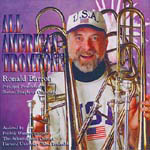
ALL-AMERICAN TROMBONE
Boston Brass Series BB-1003CD


With Fredrik Wanger, piano; The Atlantic Brass Quintet; Harvard University Wind Ensemble.
CD CONTENTS
Colloquy for Trombone (1967): William Goldstein (b.1942)
Sonata for Trombone (1961): Alec Wilder (1907-1980)
Elegy for Mippy II (1948): Leonard Bernstein (1918-1990)
Three Pieces for Trombone and Piano (1991): James Willey (b. 1939)
Bride of the Waves (1900): Herbert Clarke (1867-1945)
Thoughts of Love (1887): Arthur Pryor (1870-1942)
Annie Laurie (1895): Arthur Pryor (1870-1942)
REVIEWS
International Trombone Association Journal, Volume 26 No. 2 Spring 1998
All-American Trombone, Ronald Barron, Trombone Fredrik Wanger, piano: The Atlantic Brass Quintet; Harvard University Wind Ensemble; Thomas Everett, conductor. Boston Brass Series BB1003
William Goldstein: Colloquy for Trombone. Alec Wilder: Sonata for Trombone and Piano. Leonard Bernstein: Elegy for Mippy II. James Willey: Three Pieces for Trombone and Piano. Herbert Clarke/Joseph Foley: Bride of the Waves. Arthur Pryor/Joseph Foley: Thoughts of Love. Arthur Pryor/Richard Schumann: Annie Laurie
Ronald Barron, a member of the Boston Symphony Orchestra since 1970, explains the album's name by stating, "Here is music composed by Americans, dedicated to Americans, inspired by American trombonists, recorded by an American in the cradle of American liberty, truly an All-American presentation."
William Goldstein's Colloquy was composed in 1967 when Goldstein was a staff arranger with the U.S. Army Band. Its various compositional styles, including jazz, neo-romantic, and neo-classical, help to make it an exciting piece, especially when performed as brilliantly as it is by Barron and the Harvard Wind Ensemble.
Alec Wilder's Sonata, written in 1961 for John Swallow, has become a standard in the trombone solo repertoire. The dynamic contrasts, tone quality, and musicianship demonstrated by both Barron and Wanger are impeccable. Following this, the always enjoyable Elegy for Mippy II by Bernstein-accompanied by one's own foot-is excellently played by Barron.
James Willey's Three Pieces, the most recent of all the works on the album, was premiered at the ITW at the Eastman School of Music in 1991. Barron's recording exemplifies that this should become a mainstay in the trombone recital repertoire.
The final three numbers, Annie Laurie and the noteworthy arrangements of Bride of the Waves and Thoughts of Love by Joseph Foley of the Atlantic Brass, are all standards from the turn-of-the-century band era, and probably three of the biggest audience pleasers ever to be written for brass. The style and technique demonstrated by Barron throughout these pieces is superb.
This album is worth obtaining not only for its excellently demonstrated musicianship and stylistic integrity, but also for the lesser known works which are also played with perfection. .....Larry Campbell, Louisana State University
Fanfare Magazine, March/April 1997
In the Family, Ronald Barron, trombone, Marianne Gedigian, flute, Douglas Yeo, bass trombone, Thomas Gauger, percussion, Ann Hobson Pilot, harp, Edwin Barker, double bass Boston Brass Series BB 1004[DDD] 69:57. Produced by Ronald Barron. All-American Trombone, Ronald Barron, trombone, Fredrik Wanger, piano, The Atlantic Brass Quintet, Harvard University Wind Ensemble. Boston Brass Series BB1003 [DDD]; 61:21 Produced by Ronald Barron
Mr. Barron has been principal trombonist of the Boston Symphony Orchestra since 1975; it goes without saying that he plays superbly. Still, an hour of solo trombone might be a bit much, so Barron enlists the help of his friends. In The Family is the title of Harold Shapero's six-movement suite for trombone and flute-a neat combination-but it also refers to the players, who are all BSO members and teachers in the Boston area. Tenor and bass trombone may seem a strange combination for eight Shostakovitch piano preludes, but Douglas Yeo's arrangement provides beautiful harmonies as the two instruments cover an extremely wide range in the Shostakovitch manner. Frank Campo's Commedie is avant-garde music for trombone and percussion; it demands and receives some amazing virtuoso playing. Vaughn William's folksy suite is warm and lovely on a trombone, and the subtle harp accompaniment fits perfectly. Charles Small's clever Conversation has two neighbors schmoozing and arguing over a back fence, as reported by two trombones. Roger Kellaway's Esque is a jazz pianist's view of modern music, including "minimalist cubism" and even a tone row, with carefully worked-out structure the jazz elements display yet another side of Barron's virtuosity, but the piece sounds a bit academic nevertheless.
All-American Trombone is livelier fare. William Goldstein's Colloquy is an energetic military-band concerto, very American in its grand exuberance, and it gets the disc off to a flying start. Alec Wilder's Sonata includes a piano accompaniment, despite its title, it is calm and mellow but builds to a grand final flourish. Leonard Bernstein's Elegy (to his brother's dog) is over in two minutes. James Willey's Three Pieces are Grit, Sadness, and Hokum, the last of which is that rarity, truly funny music; it brings the disc back to life. Barron finishes strongly with three classics from the turn of the century, as The Atlantic Brass Quintet imitates the Sousa Band. This is gorgeous music; here Barron switches to a Bach 36 trombone, which he plays with the agility of a cornet and the warmth of a French horn, Annie Laurie ends with the mother of all trombone cadenzas, which should bring Barron's audiences screaming to their feet. Trombone fanciers will want both these discs, but All-American Trombone is a must for everybody. Great sound, too!......James H. North
